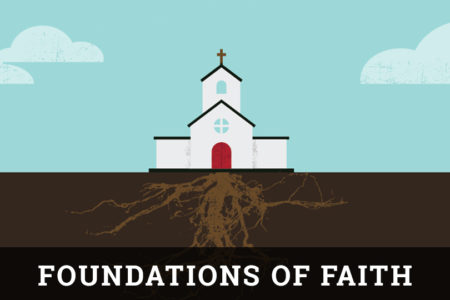General Revelation Part Two
In our previous article we examined Psalm 19:1–6, one of the biblical passages that addressed God’s uncovering of knowledge to all of mankind through the means of nature. In this article we will study two other biblical passages that indicate general revelation through nature.
ACTS 14:15–17
As a result of the miraculous healing of a lame man through Paul’s ministry, the pagan people of the city of Lystra concluded that Paul and Barnabas were gods and made preparations to worship them (Acts 14:8–13). Horrified by what was about to happen, Paul and Barnabas prevented this worship by rushing in among the people, asserting that they themselves were only human, and exhorting the people to reject their idolatry, which was contrary to reality, and turn to the God who actually exists, the God who created the universe and everything in it (vv. 14–15).
Paul and Barnabas told these people that in time past the true God did not force the Gentiles to walk in His ways. In other words, He did not put them under the restraint of the Mosaic Law, as He did the nation of Israel (Dt. 4:6–8; Rom. 2:14). Instead, He allowed them to conduct themselves according to their own ways (v. 16).
In verse 17, Paul and Barnabas hastened to add that although God dealt with the Gentiles in that manner in the past, He did not leave them without a witness concerning Himself. God gave evidence of His benevolent existence by doing good things for all humans, including pagan Gentiles, through nature—such things as giving them rain for their crops, fruitful seasons, fullness of food, and gladness. The word translated “gladness” sometimes referred to “the joy of the festive meal” and “can also be gratefully understood as the gift of God by which even the heathen may discern His providential rule.”*
ROMANS 1:18–20
In this passage concerning God’s revelation of knowledge about Himself through nature, Paul declared that God’s wrath is being revealed from heaven against all ungodliness and unrighteousness of men (v. 18). The word translated “ungodliness” refers to the religious condition of those involved in false worship.* Paul equated this ungodliness with the “despising of God” that prompted the ancient Greeks, Romans, and Egyptians to develop idolatrous religions (vv. 21–23, 25).* The word translated “unrighteousness” was equated with the “sexual and social perversion” or “unlawful conduct towards” other humans described in verses 24, 26–32.*
The apostle indicated that the underlying cause of this false worship and perverted conduct was bias against the true God. The people guilty of these things possessed knowledge concerning God, but “they did not like to retain God in their knowledge” (v. 28), and they did not glorify Him as God or have an attitude of gratitude toward Him for His blessings (v. 21). The verb translated “did like” (v. 28) means “approve” and is equal to “intend, wish.”* Thus, Paul was saying that these people did not approve of having God in their knowledge; therefore, they willfully intended to exclude His existence from their perception of reality.
That these people possessed knowledge concerning God but willfully intended to exclude His existence from their perception of reality indicates that they had a problem with their will, not their intellect. In other words, they did this, not because intellectually they could not believe in the existence of God, but because volitionally they did not want to believe in His existence. In spite of this, they tried to make it appear that they had to reject God’s existence for intellectual reasons. They did this by asserting that they were wise to do so (v. 22) and thereby used the issue of intellect as a smoke screen to hide the real cause of their action.
Their willful rejection of God’s existence prompted them to “hold the truth in unrighteousness” (v. 18). The word translated “hold” means “suppress”* or “holding in prison.”* In this passage, the word “truth” refers to “the ‘revealed reality’ of God.”* Thus, they were suppressing or holding in prison the reality of God that was revealed to them. A criminal is put in prison, away from society, so that he cannot do harm to society, and society does not have to be concerned about him. Likewise these people imprisoned the revealed reality of God away from their perception of reality so that they could not be affected by it and would not have to be concerned about it.
The word translated “in” in the expression “in unrighteousness” means “with, by means of.”* These people used unrighteousness as their means to imprison the revealed reality of God. This indicates that the basis of their bias against God was their unrighteous philosophy of life, values, and lifestyle. They willfully rejected the reality of God’s existence because His existence had serious implications concerning those areas of their lives, and they did not want to change those areas. Thus, it was because of their morality and ethics, not intellect, that they rejected God’s existence.
The word translated “because” at the beginning of verse 19 has strong “causal force.”* Paul used it to introduce the major reason for God’s wrath being revealed against the ungodliness and unrighteousness of the rejecters of His existence. They had no legitimate excuse for rejecting and ignoring His existence because He had clearly revealed it to them.
The word translated “known” in the phrase “that which may be known of God” refers to what is “capable of being known, intelligible”* or “recognizable.”* It is singular and refers to knowledge concerning God that is intelligible to humans and capable of being known or recognized by them.
Paul declared that this body of knowledge “is manifest in them.” The word translated “manifest” means “visible, clear, plainly to be seen, open, plain, evident, known.”* It refers to “what can be perceived by the senses but in such a way that the perception involves understanding.”* This body of knowledge was very evident to its rejecters. It could be plainly seen or perceived by their senses if they could understand it and its implications for their lives.
This body of knowledge could be plainly seen because “God hath showed it unto them.” The verb translated “hath showed” has “causative significance” and means “to make visible what is invisible.”* God took the initiative. He is invisible to mortal humans (Jn. 1:18; Col. 1:15; 1 Tim. 1:17), but He wanted His human creatures to know that He exists. As a result, He devised a visible way to reveal His existence to mortal man.
Paul explained how God revealed His existence to the rejecters: “For the invisible things of him from the creation of the world are clearly seen, being understood by the things that are made” (v. 20). God revealed knowledge concerning His invisible self through nature, the visible universe that He created.
The combination of the verb “are clearly seen” with the expression “being understood” indicates that the seeing involved “an intellectual process.”* Thus, Paul was saying that God’s “invisible nature is perceived with the eye of reason in the things that have been made.”* In other words, as they observed nature, the rejecters intellectually perceived and understood the knowledge that God revealed about Himself through that means.
Paul identified two things concerning God that are revealed and clearly seen through nature “his eternal power and Godhead.” The word translated “Godhead” means “divinity, divine nature”* or “that which shows God to be God.”* Thus, through nature, the existence of a being with a divine nature (God’s existence) is revealed. God’s eternal power is also revealed through nature. He had to have incredible power before the creation of the universe to bring it into existence.
IMPLICATIONS
Paul’s language in Romans 1:18–20 implies several things. First, the revelation concerning God through nature began at creation and continues throughout history to the present. Thus, it has been intellectually perceptible to humans of all periods of time.
Second, those who reject the existence of the eternally powerful God who created the universe do so because of a problem with their will, not their intellect. They do it, not because intellectually they cannot believe in God’s existence, but because volitionally they don’t want to accept His existence because of the practical implications it will have for them. Thus, they willfully suppress or imprison the knowledge of God that they perceive through nature to keep it away from their view of reality.
Years ago a very intelligent man told me that he really wanted to believe in Jesus Christ but couldn’t for intellectual reasons. He had heard all the evidences and arguments in favor of belief but said that he would have to commit intellectual suicide to believe the biblical claims concerning Christ.
On the basis of Romans 1:18–20, I told him, “Your problem is moral or ethical in nature, not intellectual. It is not that intellectually you cannot believe, but that volitionally you don’t want to believe because of the implications it will have for you. You are using the intellectual as a smoke screen to cover up the real cause of your unbelief.”
He got a smirk on his face and said, “You just put your finger on the nerve. I know that if I believe, I will have to change some practices in my vocation, and I’m not certain that I want to make those changes.”








